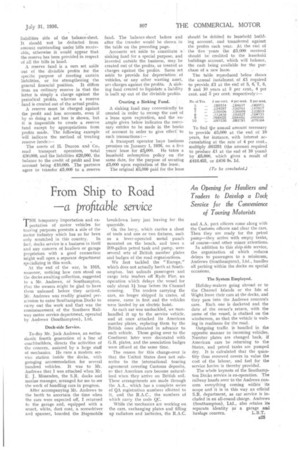From Ship to Road
Page 31

If you've noticed an error in this article please click here to report it so we can fix it.
—a profitable service
THE temporary importation and exportation of motor vehicles for touring purposes presents a side of the motor industry which has so far been only scratched in this country. In fact, docks service is a business in itself and any concern of hauliers or garage proprietors with a good connection might well open a separate department specializing in this work.
At the end of the war, in 1918, someone, noticing bow cars stood on the docks awaiting collection, suggested to a Mr. Andrews, of Southampton, that the owners might be glad to have them unboxed before they arrived. Mr. Andrews was readily granted permission to enter Southampton Docks to carry out the work and that was the commencement of the Southern Railway motor service department, operated by Andrews (Southampton), Ltd.
Dock-side Service.
To-day Mr. Jack Andrews, an enthusiastic fourth generation of a line of coach builders, directs the activities of the concern, assisted by a large staff of mechanics. He runs a modern service station inside the docks, with garaging accommodation for several hundred vehicles. It was to Mr. Andrews that I was attached when Mr. E. J. Missenden, the S.R. docks and marine manager, arranged for me to see the work of handling cars in progress.
After accompanying Mr. Andrews to the berth to ascertain the time when the cars were expected off, I returned to the garage and, equipped with a smart, white, dust coat, a screwdriver and spanner, boarded the Hupmobile breakdown lorry just leaving for the quayside.
On the lorry, which carries a chest of tools and one or two fixtures, such as a lever-operated metal punch mounted on the bench, and tows a 200-gallon petrol tank and pump, were several sets of British number plates and badges of the road organizations.
We first tackled the "Europa," which does not actually berth at Southampton, but unloads passengers and cargo into tenders off Ryde Pier, an operation which delays the vessel for only about 1 hour before its Channel
crossing. The tenders carrying the cars, no longer shipped in crates, of course, came in first and the vehicles were landed by an electric hoist.
As each car was unshackled, we manhandled it up to the service vehicle, and at once attacked its American number plates, replacing them by the British ones allocated in advance to each vehicle. Those going over to the Continent later were decorated with G.B. plates, and the association badges were affixed at the same time.
The reason for this change-over is that the United States does not subscribe to the international touring agreement covering Customs deposits, so that American cars become naturalized when they arrive on British soil. These arrangements are made through the A.A., which has a complete series of QA registration numbers allotted to it, and the R.A.C., the numbers of which carry the code QC.
While the. mechanics are working on the cars, exchanging plates and filling up radiators and batteries, the R.A.C. and A.A. port officers come along with the Customs officers and clear the cars. Then they are ready for the petrol pump—they arrive with empty tanks, of course—and other minor attentions.
In addition to this ship-side service, the organization of which reduces delays to passengers to a minimum, Andrews (Southampton), Ltd., handles all parking within the docks on special occasions, The System Employed.
Holiday-makers going abroad or to the Channel Islands or the Isle of Wight leave their cars at the docks, and they pass into the Andrews concern's care. Each one is docketed and the date of the owner's return, with the name of the vessel, is chalked on the windscreen, so that the vehicle is waiting in readiness for the road.
Outgoing traffic is handled in the opposite manner to incoming vehicles. Number plates are changed back, if American cars be returning to the States, and petrol tanks are pumped dry. It is calculated that the quantity thus removed covers in value the cost of the labour, and fuel for the service lorries is thereby provided.
The whole keynote of the Southamp ton Docks service is co-operation. The railway hands over to the Andrews concern everything coming within its scope and it is in this way an official S.R. department, as car service is included in an all-round charge. Andrews
(Southampton), Ltd., also retains its separate identity as a garage and
haulage concern. L.B.T.












































































